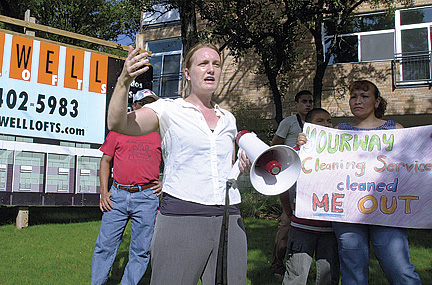Emily Timm considers herself shy, which is strange since she spends a good deal of her time in showdowns and shouting matches with beefy bosses in the construction industry. Timm, a labor organizer in Austin, Texas, says she's had employers storm out of the room screaming, tear up documents in her face, and threaten her. Despite all this, Timm manages to hold her ground.

During her junior year at Brown, Timm travelled to Brazil, where she was able to meet several leaders of local advocacy groups and protest movements. They became role models for her, she says. At Brown, she also studied participatory democracy in her thesis work, mentored by sociologist Patrick Heller. In her research, she says, she learned that "people who are living through oppression are the ones who need to be the leaders in winning change."
Timm started out working for a social service agency in her home state of Maryland and moved to Texas when a friend persuaded her to work with her at Casa Marianella, a shelter for recently arrived Latin American immigrants. "Growing up on the East Coast, I never thought I'd move to the Southwest," Timm says.
As more and more immigrants came through its doors complaining about unfair labor practices, Casa Marianella decided it needed to give voice to these complaints and started the Workers Defense Project. Timm says construction workers in Austin often get no rest or water breaks, have to use unsafe equipment, and face employers who work them hard, then don't pay their wages. In response, WDP has started classes that teach workers about the history of the American labor movement and local and national laws. There are also classes in leadership so the immigrants can go back to their communities as organizers.
Timm will also go and meet with employers and negotiate a settlement on behalf of a worker whose salary is in dispute. In extreme circumstances, she will help to organize strikes, take the workers' grievances to City Hall, and launch public campaigns to shame the business. Recently, Timm got a manager to sit down and agree to listen to the complaints of roughly a dozen workers. They spoke of barely being able to get by on their wages and of unsafe conditions at work sites. Eventually, the manager relented.
Last summer, WPD's efforts got the federal government's Occupational Safety and Health Administration (OSHA) to send out 60 investigators to inspect over 2,000 work sites. More than $2 million in violations were issued. "I would go out to work past the neighborhoods where I had never seen anyone wearing a harness or a hard hat," Timm says. "Then I actually saw people using the equipment—equipment employers are supposed to provide."
Liam Daniel Pierce is a radio journalist living in Oakland, CA.
.




